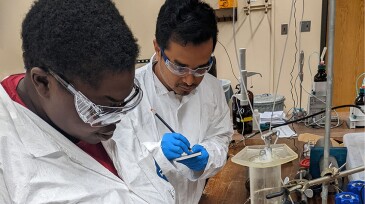energy education
-
SPE President Terry Palisch is joined by Jennifer Miskimins, department head of petroleum engineering at the Colorado School of Mines, to discuss the academic aspect of petroleum engineering and its future.
-
SPE President Terry Palisch is joined by Dana Otillio, vice president of SPE’s marketing and communications, to discuss how members can maximize their membership by leveraging multimedia content.
-
A survey of SPE members associated with a university, or their job/role to be faculty, collected information about the effect of the energy transition on recruiting students, strategic directions in academic programs, and maintaining a relevant curriculum for future careers.
-
More Students Going Into Petroleum Engineering Programs as Research Work Tilts to Alternative EnergyMore freshmen are enrolling in petroleum engineering, drawn by strong demand for graduates.
-
The expanded scope of our evolving industry means that members of the petroleum engineering profession will enjoy a long, rewarding career. At the same time, we will need to continue developing our competencies to enable expected contributions in producing new forms of energy resources.
-
The industry continues its move toward energy transition, demonstrating different stages among companies. These industry changes are affecting our current and future members, and SPE is working to provide guidance and education to our members through many avenues.
-
Opening additional channels of communication with our members provided important feedback to move forward with the Strategic Plan.
-
As the world continues to grapple with the post-pandemic new normal and unfamiliar global uncertainty, the case to begin and commit to a career in the upstream subsurface industry may be harder to see, but it’s still rewarding and with longevity.
-
The model of “learn at school and do at work” is outdated and must keep up with the changing environment of the Industrial Revolution 4.0. Petroleum engineering curricula, therefore, must also change accordingly. It is time to examine the core curricula being taught at petroleum schools so that long-term sustainability can be established.
-
SPE has established three new technical sections—the Management Technical Section, the Methane Emissions Management Technical Section, and the Data Science & Engineering Analytics Technical Section.









